by Dennis Hancock
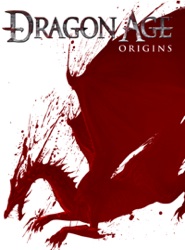 Dragon Age: Origins
Dragon Age: Origins
Developed by: BioWare
Platform: Windows XP or newer, Xbox 360, & Playstation 3
Minimum System Requirements: 1.8GHz Dual Core Processor, 1.5GB Ram, 20GB Hard Drive Space, Nvidia GeForce 6600GT w/ 128MB ram or ATI Radeon x850 w/ 128MB ram
Release date: November 3rd, 2009
Price: $49.99
Every time I find a really good computer game, I run out and tell my
friends about it. Generally, I am trying to get them to buy it so we can
play online together, but this time it's different. This time, it's all
about the story. Baldur's Gate, Baldur's Gate II, Star Wars: Knights
of the Old Republic, and Mass Effect all have one thing in
common: BioWare. Since 1998, BioWare has been creating in
depth computer RPG's that require the player to resolve some sort of
moral dilemma. These choices are always up to the player to decide how
to react, and the course of the story is often altered to some degree
depending on the reaction. Recently BioWare released Dragon
Age: Origins, a new volume in the history of RPG's.
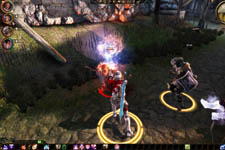 Dragon Age: Origins is a gritty single player role-playing game
where you take the lead as the hero of the story. You'll lead your party
of stalwart companions across the map to different cities, dungeons, and
places of mystery long forgotten. You may live, you may die, but like
any good RPG worth its salt, the fate of the free world rests with you.
Will you make the ultimate sacrifice for freedom, or will you sell out
to save your own skin? Either way, put down the dice, back away from the
rulebook, and let the computer guide you on your adventure today. Your
GM could probably use the break anyway...
Dragon Age: Origins is a gritty single player role-playing game
where you take the lead as the hero of the story. You'll lead your party
of stalwart companions across the map to different cities, dungeons, and
places of mystery long forgotten. You may live, you may die, but like
any good RPG worth its salt, the fate of the free world rests with you.
Will you make the ultimate sacrifice for freedom, or will you sell out
to save your own skin? Either way, put down the dice, back away from the
rulebook, and let the computer guide you on your adventure today. Your
GM could probably use the break anyway...
The Story
For generations, a group known as the Grey Wardens has walked the lands
to combat and defend against an evil force known as the Dark spawn.
Think of the Goblins, Orcs, and Trolls from Lord of the Rings and
you have a pretty good idea of what the Dark spawn look like. Every so
often an Arch-demon rises and gathers the Dark spawn into an army to
march across the land. In their wake is left nothing but death,
destruction, and pestilence. Only the Grey Wardens can detect the
presence of an Arch-demon and combat their threat. In ages past it took
the united forces of the humans, dwarves, and elves working together to
defeat the threat of a Dark spawn incursion.
The whole idea of the Grey Wardens is similar to that of the Jedi,
albeit a bit toned down. Grey Wardens have some added powers, but they
aren't super human. In fact, the act of becoming a Grey Warden could be
considered somewhat of a curse.
The Races
In Dragon Age: Origins you get to play as a member of one of the
three races of the land of Ferelden. The race and class you choose
determine the location in which you start.
Humans
Like most fantasy RPGs, humans are of the most abundant of the humanoid
races. They are mages, rogues, warriors, nobles, and peasants. Much of
the land is dominated by them and has been as such for a thousand years.
Starting as a human, you have the option to be a Warrior, a Rogue, or a
Mage. If you choose the Warrior or Rogue option, you start as a noble.
If you choose the Mage option, you start in the Circle of Magi.
Dwarves
Once upon a time, the Dwarves ruled the underground – they had vast
cities and their reach spread throughout most of the world. Now they are
beaten back to defensible positions and do all they can to maintain
their last remaining cities. Much as you would expect, Dwarves are
short, stout, live underground, and are renown for their expert
craftsmanship. They are also known for cutthroat politics and constant
bickering with one another. Dwarves are no strangers to Dark spawn – the
old roads are overrun, and it is only the Dwarven warrior caste that
keeps them at bay. As a Dwarf you have the option to play as a Warrior
or a Rogue, and can also choose to be Casteless or a Noble. As a Noble,
you are second in line to the throne; as a Casteless Dwarf, you are as
worthless as the dust on your shoes.
Elves
Elves have a long, eventful past. At one time they were the most
advanced race in all of Ferelden, but that was over a thousand years
ago. They were conquered by Humans and became slaves, losing much of
their history. Finally, it was Andraste, the chosen disciple of The
Maker, who finally gave them their freedom. Having lost much of their
history and racial identity, many of the Elves remained in human lands.
Areas were sectioned off, known as alienages, where the Elves were
segregated. The alienage Elves lived on the edges of human society, off
the scraps that were tossed to them. Many of them became servants in
human households and were treated horribly. A separate group of Elves
broke off from their city-dwelling kin and returned to the forests to
reclaim their history – these Elves are known as the Dalish. The Dalish
live free, but have long memories of the time they lived as slaves to
Humans. As an Elf, you can be any of the three classes. Warriors and
Rogues can be either Dalish or Alienage Elves, while all Mages start off
with the Circle of Magi.
Gameplay
No matter which race or class you start off with, eventually all roads
will merge at Ostagaar. You won't actually have much in the way of
decision making until you leave this area, as most of the events here
are scripted for you. Ostagaar is where you get to dip your toes into
the system and actually test out combat, buying/selling gear, and
learning about the general state of the world. There are also a couple
of small quests here for you to get the hang of how things work.
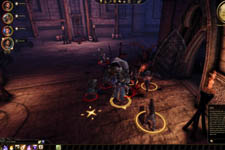 Every gamer knows that even a story-driven game can be destroyed by a
poor combat system. DA:O keeps combat entertaining and tense.
There are two basic modes for combat and exploring: an over the shoulder
third-person view, and a top down tactical view. I prefer the
third-person view most of the time, but the top down tactical view gives
a nice clear picture of where everyone is when a battle breaks out and
your party gets split up. Another nice feature is what I call the "Oh
Shift" button – that's the space bar. When you decide battle is
moving too quickly for your taste (and you will at some point), you can
tap your friendly space bar and pause the action. As time freezes, you
can then jump to your companions and queue up actions like using a
health poultice, shield bashing a particular nasty brute, or frying
someone to a crisp with a fireball. Some skills require you to be
flanking an opponent in order to work (backstab is a good example – it
deals a powerful hit when triggered from behind an opponent).
Every gamer knows that even a story-driven game can be destroyed by a
poor combat system. DA:O keeps combat entertaining and tense.
There are two basic modes for combat and exploring: an over the shoulder
third-person view, and a top down tactical view. I prefer the
third-person view most of the time, but the top down tactical view gives
a nice clear picture of where everyone is when a battle breaks out and
your party gets split up. Another nice feature is what I call the "Oh
Shift" button – that's the space bar. When you decide battle is
moving too quickly for your taste (and you will at some point), you can
tap your friendly space bar and pause the action. As time freezes, you
can then jump to your companions and queue up actions like using a
health poultice, shield bashing a particular nasty brute, or frying
someone to a crisp with a fireball. Some skills require you to be
flanking an opponent in order to work (backstab is a good example – it
deals a powerful hit when triggered from behind an opponent).
There are several ways to kill off opponents, but in order to be an
effective warrior, it's generally best to specialize in one style of
combat.
Sword and Shield is a good all-around style that allows for a good
offense and defense. There are some defensive toggles, which allow the
player a bonus against different styles of attacks and shield bashing
which can save a friend who has been pounced on by an angry critter.
Two Handed weapons were not my preference, but that is another style
available if you are so inclined. Most of those attacks are powerful but
slow, and they lack defense. Be warned: plan on buying some really good
armor if you want to use this style.
Two-weapon fighting is an interesting style. To start off you must use
something small in your off hand, like a dagger. Later on you can hone
your skills so you can use two swords. This style would seem to allow
for higher damage over time but lower damage per hit.
Out of combat, movement is pretty straightforward – the only character
you have to worry about is yourself, and your party members will follow
wherever you go. This can be achieved through pointing and clicking via
the mouse, or using the W,S,A,D keys on the keyboard. During combat, it
is generally more efficient to click where you want your characters to
go with the mouse. Clicking on an enemy will cause the character to
attack whichever you clicked on, by either running up to the guy and
bashing him or hitting him from range. This system does have one rather
annoying flaw that comes up occasionally. Sometimes when you get to a
battle and want to concentrate on a specific enemy, other enemies or
fellow party members surround the target. This can lead to frustrating
moments when you realize, for the last three swings, one party member is
unable to reach the target and has been standing there with his finger
up his nose, drooling – quite possibly while getting beat on by a nearby
thug. Sometimes the AI pathing works itself out, and sometimes you just
need to switch targets and carve a way to the guy you're really after.
I'm fine with having to carve a path to your target, but I'm definitely
not fine with my party member scratching his butt while he gets beat on.
If the party member in question can't attack the target, he should
attack the next closest target, or maybe there should be an audible
warning so the player knows he needs to pick a new enemy to slay.
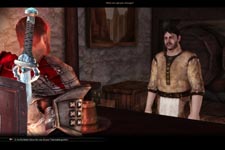 Inventory management is another issue I often have with computer RPGs.
When game developers screw up, this is usually an area that suffers.
These problems generally make it a pain for the player to buy and sell
items. Thankfully, the developers of Dragon Age: Origins have
categorized the inventory screen and the game's merchants in order to
make this process much easier. Items are categorized by their use:
Weapons, Armor, Jewelry, Utility Items, Non-Utility Items, and Quest
Items. Whenever you want to browse a certain category, just click on the
tab in your inventory or on a local merchant and you can see what is
available. You can also cycle through the selected characters on these
screens; through this method you can compare items in your inventory
against items the character is already using.
Inventory management is another issue I often have with computer RPGs.
When game developers screw up, this is usually an area that suffers.
These problems generally make it a pain for the player to buy and sell
items. Thankfully, the developers of Dragon Age: Origins have
categorized the inventory screen and the game's merchants in order to
make this process much easier. Items are categorized by their use:
Weapons, Armor, Jewelry, Utility Items, Non-Utility Items, and Quest
Items. Whenever you want to browse a certain category, just click on the
tab in your inventory or on a local merchant and you can see what is
available. You can also cycle through the selected characters on these
screens; through this method you can compare items in your inventory
against items the character is already using.
Traveling companions
Much of your time will be spent running to and fro, speaking with
various people and trying to get them to see your point of view –
sometimes by force, sometimes by cunning and guile. The lineup of voice
acting is outstanding and very believable, and includes a few bigger
names like Steve Valentine, Kate Mulgrew, and Tim Curry. During
conversation you are often given the opportunity to choose your response
to the given dialogue. Two to four responses are generally available,
but certain skills or particularly high abilities may open up additional
responses.
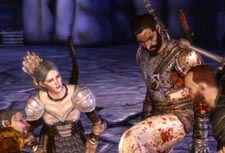 No matter what type of character you choose to play, during the course
of gameplay you will run into a wide array of companions to help you out
along the way. You can have three companions follow you at any given
time, so choose carefully when entering a dungeon or town. The only
places you can swap party members out are in camp and some safe
locations. There is also a limit to the number of characters willing to
hang out in camp and be available for party use. I never did hit the
maximum because I ended up turning some characters away. There were a
couple that tried to kill me when I first encountered them, I found it a
little distasteful to invite them into the party after that.
No matter what type of character you choose to play, during the course
of gameplay you will run into a wide array of companions to help you out
along the way. You can have three companions follow you at any given
time, so choose carefully when entering a dungeon or town. The only
places you can swap party members out are in camp and some safe
locations. There is also a limit to the number of characters willing to
hang out in camp and be available for party use. I never did hit the
maximum because I ended up turning some characters away. There were a
couple that tried to kill me when I first encountered them, I found it a
little distasteful to invite them into the party after that.
Just like real life, these companions all have their own personalities.
While running around, occasionally your companions will strike up
conversation with one another, often times tipping you off to their
personality types and letting you know if they will react positively or
negatively to certain lines of questioning. Generally, anything
involving Alistair, Morrigan, or Sten is going to be pretty funny. Why
does this matter? Well, since the supporting characters all have their
own personalities, they all have their own motivations for traveling
with you. Some may find your actions distasteful and decide they have
had it with you, others might decide you are the best thing since sliced
bread. Alistair, for instance, is one of the first companions you meet.
He seems a generally likeable guy, and is for all intents and purposes a
goody two-shoes. If you do anything that could be considered evil, or
maybe just sketchy, you might very well lose some status with him unless
you can persuade him it was the right thing to do. Losing favor with
your companions may cause them to lose some stats or may even make them
leave the party altogether.
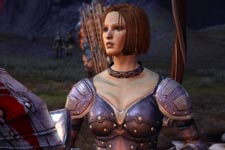 So what happens if you make a few wrong choices, slay a few too many
innocents, or decide to defile some sacred belief Alistair holds dear?
You do what any good man does when he pisses off his wife – resort to
bribery! The saying, "One man's trash is another man's treasure"
definitely holds true in DA:O. Sometimes you'll pick up items
that have no apparent use other than being flagged as a gift. By all
means, let the manipulation commence, and start handing them out.
Consider exactly what you're giving to whom, though, as not all of your
companions like the same things. You might suspect the girly girl in the
group would want all the pretty jewelry, and she might, but someone else
might appreciate it more. As you get to know your companions, you'll
find out what they are interested in.
So what happens if you make a few wrong choices, slay a few too many
innocents, or decide to defile some sacred belief Alistair holds dear?
You do what any good man does when he pisses off his wife – resort to
bribery! The saying, "One man's trash is another man's treasure"
definitely holds true in DA:O. Sometimes you'll pick up items
that have no apparent use other than being flagged as a gift. By all
means, let the manipulation commence, and start handing them out.
Consider exactly what you're giving to whom, though, as not all of your
companions like the same things. You might suspect the girly girl in the
group would want all the pretty jewelry, and she might, but someone else
might appreciate it more. As you get to know your companions, you'll
find out what they are interested in.
There's a good reason to win friends and influence your companions. As
they decide they like you more, they unlock certain abilities, quests,
and possible role-play romance. Wait... before you roll your eyes, yes,
some of it is cheesy, but some of it affects the story line in a
cool way. There are many options for relationships in the game; I'll
leave it to you to "explore" them all if you are so inclined.
Leveling yourself and your companions up is pretty straightforward –
once you have enough experience, you are awarded points to add to your
attributes and, depending on the level, sometimes given skill points and
ability points. Skill points are for upgrading Herbalism, Poison
Crafting, Trap Making, and other skills that make your life a little
easier. Ability points allow you to modify your fighting style in some
manner, whether that be increasing your two handed fighting, stealth
abilities, or even adding a new spell to your repertoire. Most of the
skills/spells available are pretty handy – some of them even have some
nifty combos. If a crafty individual were to set up a grease trap and
lead some enemies to trigger it, an enterprising wizard might find that
a fireball on a triggered grease trap creates a blazing inferno. There
are a couple of spell/skill combinations in the game that trigger extra
powerful effects, though I have yet to discover them all. Some of the
skills offered, like trap and poison crafting, only make your life
easier. My first play through the game was completely devoid of ever
once using trap or poison crafting. On a subsequent play through, I
noticed that certain battles went a lot more smoothly when I took the
time to prepare some traps and funnel enemies into my kill zones.
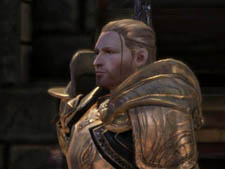 Another aspect I like is tied in with armor. Pretty much any character
can wear any armor so long as they have the strength requirements to do
so, assuming the armor isn't flagged to be worn by certain characters
only. In theory, you could have a mage running around in full plate
armor. However, there are some side effects. All armor has a fatigue
value to it. Fatigue is what allows each martial class to use their
skills. When a warrior or rogue has a full fatigue bar, they can use any
of their skills. Each swing of the weapon or use of skill uses a certain
amount of fatigue up. Once this bar is empty, the character can't use
any skills until the bar regains enough fatigue points. Certain skills
can be toggled on, but they lower your overall fatigue maximum. Mages
use mana rather than fatigue, but the affect of wearing armor works the
same. Lightweight armor has a relatively low fatigue value per piece,
maybe one or two percent, while heavier armor can be as high as five to
ten percent per piece. What this does is increase the fatigue or mana
cost of skills or spells by the fatigue percentage value. It isn't
unheard of for a warrior to have a fatigue cost of twenty five percent –
this means all of the warrior's skills cost twenty five percent more
fatigue points to use. Using a complete set of the same type of armor
applies a set bonus, which usually reduces the overall fatigue caused by
your armor, and there are sometimes other benefits as well.
Another aspect I like is tied in with armor. Pretty much any character
can wear any armor so long as they have the strength requirements to do
so, assuming the armor isn't flagged to be worn by certain characters
only. In theory, you could have a mage running around in full plate
armor. However, there are some side effects. All armor has a fatigue
value to it. Fatigue is what allows each martial class to use their
skills. When a warrior or rogue has a full fatigue bar, they can use any
of their skills. Each swing of the weapon or use of skill uses a certain
amount of fatigue up. Once this bar is empty, the character can't use
any skills until the bar regains enough fatigue points. Certain skills
can be toggled on, but they lower your overall fatigue maximum. Mages
use mana rather than fatigue, but the affect of wearing armor works the
same. Lightweight armor has a relatively low fatigue value per piece,
maybe one or two percent, while heavier armor can be as high as five to
ten percent per piece. What this does is increase the fatigue or mana
cost of skills or spells by the fatigue percentage value. It isn't
unheard of for a warrior to have a fatigue cost of twenty five percent –
this means all of the warrior's skills cost twenty five percent more
fatigue points to use. Using a complete set of the same type of armor
applies a set bonus, which usually reduces the overall fatigue caused by
your armor, and there are sometimes other benefits as well.
I quite enjoy games with a high replayability value. DA:O does a
pretty fair job of adding this, but you can only do so much without
continually changing the storyline. Some elements of the story are open
to change, but the overall story arch will remain essentially the same.
If you are the type of person who likes to go through and discover all
the little elements of plot and dialogue, you will love this game. If,
after one play through, you decide you know the story and don't need
another run through, you will probably still enjoy this game.
My first play through took me approximately 65 hours to complete.
Obviously I missed a few side quests here and there, but I think I did a
pretty fair job of hitting most of them. I'd estimate I completed about
75% of the game, including some of the downloadable content. Speaking of
downloadable content, in the range of $5 - $10, BioWare has
created additional adventures you can download to modify your gameplay.
Obviously this is good for BioWare as it continues to bring in money,
but they have also decided to release developer tools so you too can
create your own content. With the addition of the developer tools, I can
see whole campaigns being added to the game. I can't wait!
Recently, Bioware announced an expansion to Dragon Age: Origins.
On March 16th 2010, Dragon Age: Origins – Awakening will be
unleashed on the gaming community. This expansion takes place after the
events in the original Dragon Age and has been priced at $39.99.
For that price I expect to be able to play the game for another 50+
hours – anything less than that will be a disappointment. I plan on
waiting to see how many hours of gameplay the expansion adds before I
run out and get it.
DRM, System Requirements, & Performance
Most computer gamers will tell you DRM is horrible and for the most part
ends up punishing paying customers for the misdeeds of software pirates.
I am happy to report DA:O has only the most minimal of DRM
requirements. While the disc is required to be in the drive during
gameplay, there is no other software or online authentication required
to play. Rest easy: your computer won't be hobbled by poorly coded
security software in a feeble attempt to keep pirates at bay.
For the most part, the game ran pretty smoothly on my system, but there were a few
hiccups. I pre-ordered and was offered some exclusive content, some gear
for my character. However, during one of the character introductions,
the main character gets stripped of gear, which unfortunately included
my pre-order content. I suppose this was just a coding oversight but it
was somewhat annoying. At the time of gameplay there was a workaround,
but I had to go to the BioWare forums to locate it. I'm not sure if this
particular flaw has been fixed yet.
DA:O also had the tendency to start lagging after about an hour
or two of playtime. Initially when a new area was loaded, it only took a
few seconds. After an hour or two of game time, loading took somewhere
in the area of 45 seconds to a minute and even more on one occasion.
Problems such as this are often times attributed to a memory leak in the
software, which can be difficult to locate and fix.
As much as it pains me to say it, if you are still hanging onto a single
core processor, it's time to upgrade. I just made the leap myself – bite
the bullet and do it, you won't be disappointed. The system requirements
for DA:O are relatively low considering some of the other games
released of late. I'm always happy to see good games with minimum specs
on the lower end.
Minimum DA:O requirements running under Windows XP:
Windows XP Service Pack 3
Intel Dual Core 1.4 GHz or
AMD Dual Core 1.8 GHz
1Gb of System Memory
ATI Radeon x850 w/ 128Mb of Video Ram or Greater
Nvidia GeForce 6600 w/ 128Mb of Video Ram or Greater
DVD Rom
20Gb of Hard Drive Space
Minimum DA:O requirements running under Windows Vista:
Windows Vista Service Pack 1
Intel Dual Core 1.6 GHz or Greater
AMD (Not Listed)
1.5Gb of System Memory
ATI Radeon 1550 w/ 256Mb of Video Ram or Greater
Nvidia GeForce 7600 GT w/ 256Mb of Video Ram or Greater
DVD Rom
20Gb of Hard Drive Space
Conclusions
Not only is Dragon Age: Origins exceptionally well written, it is
incredibly addictive. On more than one occasion I have looked at the
clock to realize it was 3 AM, so beware! The story is so in-depth; I
figured it would make for an awesome pen and paper adventure for my game
group. Apparently somebody was thinking ahead, and the folks at Green Ronin Publishing jumped all
over that one and announced their intent to release Dragon Age as
a pen and paper RPG, which is already available in PDF form and should
be on store shelves early February 2010. [EDIT: In stores now. - Sven] I'm excited, to say the least.
If any of you out there intend to give it a whirl, I highly recommend
playing the video game. I can't think of a more enjoyable way to learn
the background of a game system... assuming the tabletop version doesn't
stray too far from the video game lore.
Ratings
Difficulty: 3.5 of 5 – Hard is really hard, while easy still offers SOME challenges.
Fun: 5 of 5 – The story and combat is fun and addicting.
Graphics: 4 of 5 – The characters and environment look good.
System Requirements: 3.5 of 5 – The creators did a good job of
keeping requirements somewhat low.
Overall Rating: 4 of 5 – Time and Entertainment vs. Cost is well worth it!


 Dragon Age: Origins
Dragon Age: Origins




